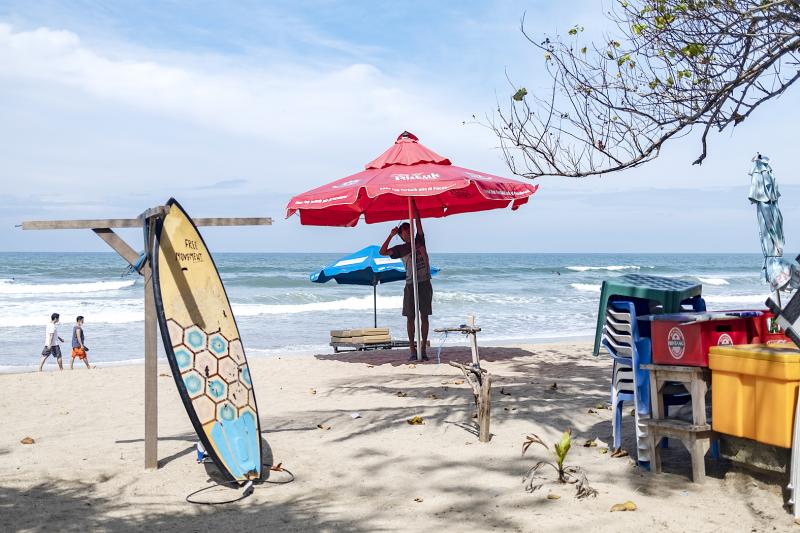Indonesia’s holiday island of Bali was to welcome its first direct flight carrying foreign tourists for nearly two years yesterday, with just a handful of visitors on board to enter strict quarantine on arrival.
A Garuda Indonesia flight from Tokyo was scheduled to arrive in Bali in the afternoon, with six foreigners and six Indonesians aboard, said Ida Ayu Indah Yustikarini, an official at the Bali Government Tourism Office.
Though the island officially opened to visitors from China, New Zealand, Japan and a few other countries in mid-October, there have been no direct non-cargo flights since then.

Photo: EPA
The six foreign tourists arriving from Tokyo were traveling using business visas since the new rules for tourists were not ready when they applied to come, Yustikarini said.
Indonesia has said restarting international flights is intended to boost Bali’s battered tourism sector, which usually accounts for 54 percent of its economy.
Known for its surfing, temples, waterfalls and nightlife, Bali drew 6.2 million foreign visitors in 2019, the year before COVID-19 struck. The entire country recorded just 1.6 million foreign visitors last year, down 61.57 percent from 2020.
However, Indonesia is maintaining much stricter quarantine requirements than Southeast Asian neighbors Thailand, which resumed quarantine-free entry for vaccinated visitors from Tuesday and the Philippines, which will do the same from Feb. 10.
Vaccinated tourists to Bali must quarantine between five and seven days at hotels or on vessels offshore.
Bali’s slow reopening comes as Indonesia has been seeing a steady increase in COVID-19 cases, primarily driven by the Omicron variant.
The country on Wednesday reported nearly 18,000 infections, the highest tally since August.
Singapore Airlines Ltd said last week it would resume flights to Bali from Singapore starting on Feb. 16.
Garuda also said on Wednesday it had started a cargo flight from Bali to Japan, carrying 17 tonnes of goods including tuna fish. Most Asian airlines have relied heavily on cargo revenue during the pandemic due to low passenger numbers.
Last week, Indonesia opened two islands close to Singapore to visitors from the city-state, though visitors are confined to specific resort areas.

Intel Corp chief executive officer Lip-Bu Tan (陳立武) is expected to meet with Taiwanese suppliers next month in conjunction with the opening of the Computex Taipei trade show, supply chain sources said on Monday. The visit, the first for Tan to Taiwan since assuming his new post last month, would be aimed at enhancing Intel’s ties with suppliers in Taiwan as he attempts to help turn around the struggling US chipmaker, the sources said. Tan is to hold a banquet to celebrate Intel’s 40-year presence in Taiwan before Computex opens on May 20 and invite dozens of Taiwanese suppliers to exchange views

Application-specific integrated circuit designer Faraday Technology Corp (智原) yesterday said that although revenue this quarter would decline 30 percent from last quarter, it retained its full-year forecast of revenue growth of 100 percent. The company attributed the quarterly drop to a slowdown in customers’ production of chips using Faraday’s advanced packaging technology. The company is still confident about its revenue growth this year, given its strong “design-win” — or the projects it won to help customers design their chips, Faraday president Steve Wang (王國雍) told an online earnings conference. “The design-win this year is better than we expected. We believe we will win

Quanta Computer Inc (廣達) chairman Barry Lam (林百里) is expected to share his views about the artificial intelligence (AI) industry’s prospects during his speech at the company’s 37th anniversary ceremony, as AI servers have become a new growth engine for the equipment manufacturing service provider. Lam’s speech is much anticipated, as Quanta has risen as one of the world’s major AI server suppliers. The company reported a 30 percent year-on-year growth in consolidated revenue to NT$1.41 trillion (US$43.35 billion) last year, thanks to fast-growing demand for servers, especially those with AI capabilities. The company told investors in November last year that

Power supply and electronic components maker Delta Electronics Inc (台達電) yesterday said it plans to ship its new 1 megawatt charging systems for electric trucks and buses in the first half of next year at the earliest. The new charging piles, which deliver up to 1 megawatt of charging power, are designed for heavy-duty electric vehicles, and support a maximum current of 1,500 amperes and output of 1,250 volts, Delta said in a news release. “If everything goes smoothly, we could begin shipping those new charging systems as early as in the first half of next year,” a company official said. The new